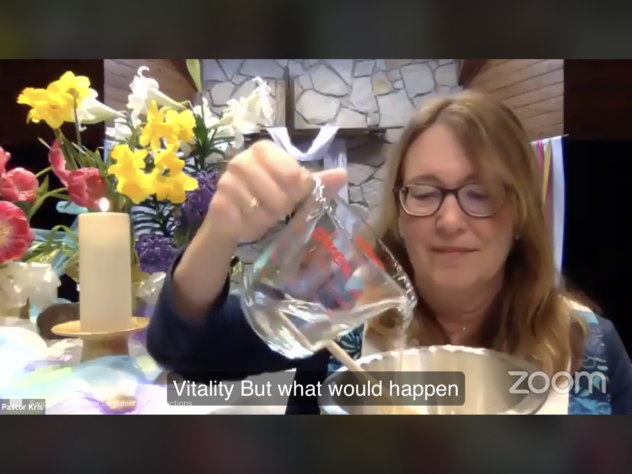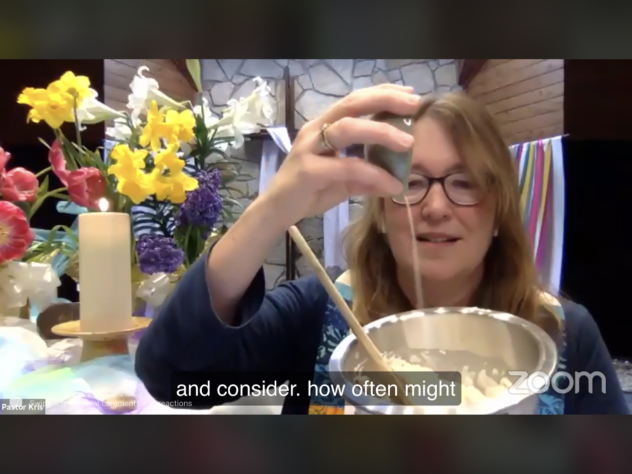Signs and Wonder: A reflection from Pastor Kris on Luke 24:13-35
If you would like to watch a video of the sermon, click HERE.
How many of you have an old cookbook, or old family recipes on index cards around the house? If so, do you have a favorite?
{In the chat feature on Zoom, people typed in responses such as: My mom’s cole slaw, vereneke, kolaches, pear bread, homemade noodles, potato hash, Czechoslovak Christmas stollen, Italian crème cake, three-minute microwave fudge, manicotti, and chocolate cake with butter cream frosting. Yum!}
In the early 1970’s, my mom wrote a regular article for the Dodgeville Chronicle, the Recipe Corner by aunt betsy. A few years ago, one of my brothers collected the newspaper clippings and put them into a book. I remember well sitting around the dining room table, eating what is simply entitled “Baked Noodles.” The recipe which was posted in the paper reads…
“An economical casserole is welcome these days and Baked Noodles, although not new, is one of our favorites. A half package of fine egg noodles costs about 17 cents, the tomato soup 14 cents, and the pound of ground beef, a few slices of bacon, some onion and bread crumbs keep the cost of this casserole low considering the amount it makes.”
There is a pound of ground beef and 6 ounces of fine egg noodles, with the other ingredients listed given in estimated amounts: One onion, one can of soup, some diced green pepper and/or celery, bread crumbs, a little butter, pepper to taste.
This is a fondly remembered recipe without precise measurements. The concept of “culinary history” is fascinating, in which people work to “gain a deeper understanding of… culture through the lens of taste.”[1] One of the oldest recipes know to us today was written in Babylonian cuneiforms. Written around 4,000 years ago, “The instructions for lamb stew read more like a list of ingredients than a bona fide recipe: ‘Meat is used. You prepare water. You add fine-grained salt, dried barley cakes, onion, Persian shallot, and milk. You crush and add leek and garlic.’”[2]
Chef Ciril Hitz writes in the Quest for Artisan Bread that, “FLOUR, WATER, SALT, AND YEAST—these four simple ingredients when combined create the magic that is bread. Baking bread is a time-honored tradition honed over more than six thousand years.”[3]
I would venture to say, our faith… is a bit like that. Throughout time, God has provided us with the recipe for breaking open the good news. However, God does not provide precise measurements. Humanity adds its own twist. We take God’s basic ingredients and mix them together—and the resulting lived experience is usually more… or less… on target. Sometimes, we do not have all of the right elements, and substitute as we must for our own time. Current concerns. God’s outline for bringing justice, creating peace, healing those who are broken in mind, body, and/or spirit, and responding with joy, we need to produce out of our own experiences.
God’s recipe is a formula for revealing new possibilities.
Take, for example, the story the author of Luke shares. Two people are walking along a dusty road. They are shattered. Less than 48 hours ago, in the midst of the holy celebration of Passover, chaos erupted. Violence, death, and fear where had been so much hope. In retelling their experience, Cleopas and his companion (who may have been his wife), describe Jesus as “a man of God, a prophet, dynamic in work and word, blessed by both God and all the people” (Luke 24:19b, The Message).
We had hoped.
We wanted things to be different.
But here we are.
We can hear the bitter disappointment in Cleopas’ account of Jesus’s death. “They had (had) a vision of God and it was anything but one who was battered and bruised by the state. Their ideas about strength, power; and redemption kept them from (perceiving) the Holy before them”[4]
Grief is like that. Trauma reshapes our world view. The rawness of our emotions swirl about and blur our vision. In his book, Listening to Grief, Rev. Dr. Dow Edgerton writes these moments leave us with, “… gashes in our understanding of the world”[5] and that “in the face of… traumatic loss, the world becomes a strange and alien place.”[6] Grief can make it hard to recognize Jesus. Edgerton goes on to note, “memories insist upon their own order and time. Try as one might to keep them orderly and obedient, they can arrive without invitation or permission.”[7]
It is there, in our lowest moments, God walks with us. Jesus joins those whose hope has been shredded and says, “tell me what has happened.” Jesus listens to their memories… and comforts. Jesus is on that long, dusty journey with us.
Luke goes on to show us the ways in which Jesus reopens for us opportunities for hope and hospitality. Yet just like making a casserole, lamb stew, or bread, more than one ingredient is needed to break open heaven on earth.
{During this portion of the sermon, Pastor Kris mixed together 4 key ingredients for making bread: flour, yeast, water, salt. She began with the flour}
The Bible tells us it is more than an encounter with Jesus that is essential. We see this in the reactions of the disciples and multitudes who followed Jesus during his life. More often than not they did not fully understand what his message. Neither did these two grief-stricken people walking from Jerusalem to Emmaus that day so soon after Jesus’s death. As followers of Jesus in 2021, we know God’s hope and continue to seek out Jesus’s presence in our own lives.
{Then she added salt}
Yet the Bible tells us God’s revelation requires more—more than a moment with Jesus. We need to stir in a wider understanding of the world around us. We need to tell our stories. Just like the women who went to the tomb early on a Sunday morning and then ran to tell others Jesus’s body was missing. Just like the 2 people on the road today who tell Jesus all they know about what happened in Jerusalem. The Good News must be told. We too need to gather and tell our stories.
And listen.
We need to hear our sacred texts, as Jesus tells them (and lives them) over and over again. Blending together the tales of humanity past, present, and future.
{Kris poured in water}
Another urgently integral ingredient in God’s transformative love Luke tells us is hospitality. What happens if this ingredient is missing?
What would have happened if… what if Cleopas and his companion had not invited the stranger… this outsider walking with them… into their home? To stay for dinner?
Would Jesus have just walked on?
Would bread have been broken and the Holy revealed?
Or not?
Because it seems hospitality is needed before bread can break open the sacred. It is not until the Jesus takes the bread, blesses and breaks it that the people around God’s table recognize him.
If hospitality is not extended, if we do not invite the unknown in… there is a risk. There is a risk that the bread of Life will not be broken and God’s holy revelation of new possibilities will not be not revealed. This meal, this Table, breaks open scripture, our sacred texts.
{And then added yeast and stirred}
Let us pause and consider: How often might Jesus be in our midst… and we neglect to invite him in?
So, here are the four ingredients once again. Jot them down: Remember the Word. Share your story. Extend Hospitality. Break Bread. This is God’s recipe. The formula for revealing new possibilities. This is the blueprint for reopening hope.
Sharing and caring… and tearing open God’s Words in our hearts once again.
Let that Good News rise here. With us and in us.
Amen.
[1] Ashley Winchester, “Travel – The World’s Oldest-Known Recipes Decoded,” BBC (BBC, November 4, 2019), http://www.bbc.com/travel/story/20191103-the-worlds-oldest-known-recipes-decoded.
[2] Ibid.
[3] Ciril Hitz, Quest for Artisan Bread (Beverly, MA: Quarry Books, 2008).
[4] From “Liturgy That Matters, April 26, 2020.” Enfleshed, 2020.
[5] Dow Edgerton, Listening to Grief (Chicago: Exploration Press, 2014), 66, 356, 998 of 3883 Kindle version.
[6] Ibid. 356.
[7] Ibid. 998.
